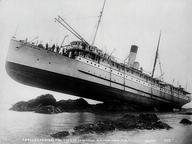Quiz Answer Key and Fun Facts
1. On January 6, Theodore Roosevelt, former President of the United States, died at his home in Oyster Bay, New York. It is said that his decline in health was hastened by the war death of his son the previous year. What was the name of that son?
2. On January 15, what revolutionary leader was murdered by soldiers during the failed Spartacist uprising in Berlin?
3. On April 25, the Bauhaus, a school of art and architecture that was to have a marked influence on modern design, was founded by Walter Gropius. Where was the Bauhaus' original home in Germany?
4. On June 11, the Triple Crown of racing was won for the first time by what horse?
5. While Charles Lindbergh achieved instant fame with his solo New York-Paris flight in 1927, his was not the first trans-Atlantic flight. This was achieved by British aviators Cpt. John Alcock and Lt. Arthur Whitten Brown on June 14, 1919 when they landed their Vickers Vimy biplane in Ireland. From where did they take off?
6. On June 28, the Versailles Treaty, officially ending World War I, was signed. Which politician did not represent his country during the course of the peace conference?
7. From July 27 to August 2, 38 people died in race riots in what American city?
8. On September 10, a police strike in Boston, Massachusetts was ended when the governor of Massachusetts, declaring "Nobody has a right to strike against the public interest at any time," ordered in state militia to keep the peace. Who was the governor?
9. On October 28, Congress passed a law providing enforcement of the 18th Amendment to the U.S. Constitution. What was this law known as?
10. On December 1, who was the first woman to take a seat in the British Parliament?
Source: Author
cobb367
This quiz was reviewed by FunTrivia editor
bloomsby before going online.
Any errors found in FunTrivia content are routinely corrected through our feedback system.


